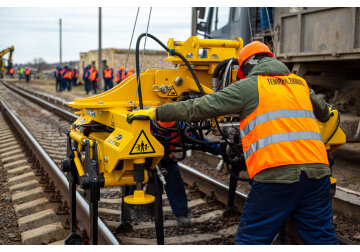
The EIB will provide Moldova with a loan of 41.205 million euros and an EU grant of 12 million euros to modernize the railway corridor Valcinet-Ocnita-Balti-Ungheni-Chisinau-Cainari.
This is stipulated by a financing contract between Moldova and the European Investment Bank (EIB), the launch of negotiations on which and its subsequent signing was approved by the Moldovan government at a meeting on Wednesday. The document is to be signed on December 18. The beneficiary of the funds allocated by the EIB will be the state enterprise Railways of Moldova (CFM). The loan will have an interest rate of about 5.036% and a repayment term of up to 30 years. The deferral fee will amount to 0.125% per annum, while the commission for non-utilization - 0.1% per annum. As noted by Minister of Infrastructure and Regional Development Andrei Spinu, the length of the railway corridor Valcinet-Ocnita-Balti-Ungheni-Chisinau-Cainari is 446 km, of which a 128 km section is in poor condition, which creates risks for the movement of trains along it and can disrupt regional logistics chains. "The North-Center rail corridor from Velcinet to Cainari is 446 km long, but on the 128 km section, due to its poor condition, train speeds are very slow, sometimes less than 5 km per hour. We will attract investments from the EBRD, EIB and EU to repair and modernize this section to improve the average train speed. The total investment program is estimated at 120 million euros, of which about 40 million euros are EU grants," Andrei Spinu said. He said that the modernization of the railway corridor will have a positive impact on Moldova's economy, as the necessary conditions will be created to attract new volumes of goods and increase the number of passengers. This is due to the fact that, after the completion of the repair works, the trains' speed will be increased, certain restrictions will be lifted and the travel time between the destinations will be reduced. There will be a significant increase in the possibilities of cargo transportation by rail, including transit and export of grain. The possibility of cargo transportation by rail will reduce the volume of cargo transportation by road and relieve the pressure on national road routes and border crossings. // 13.12.2023 - InfoMarket







